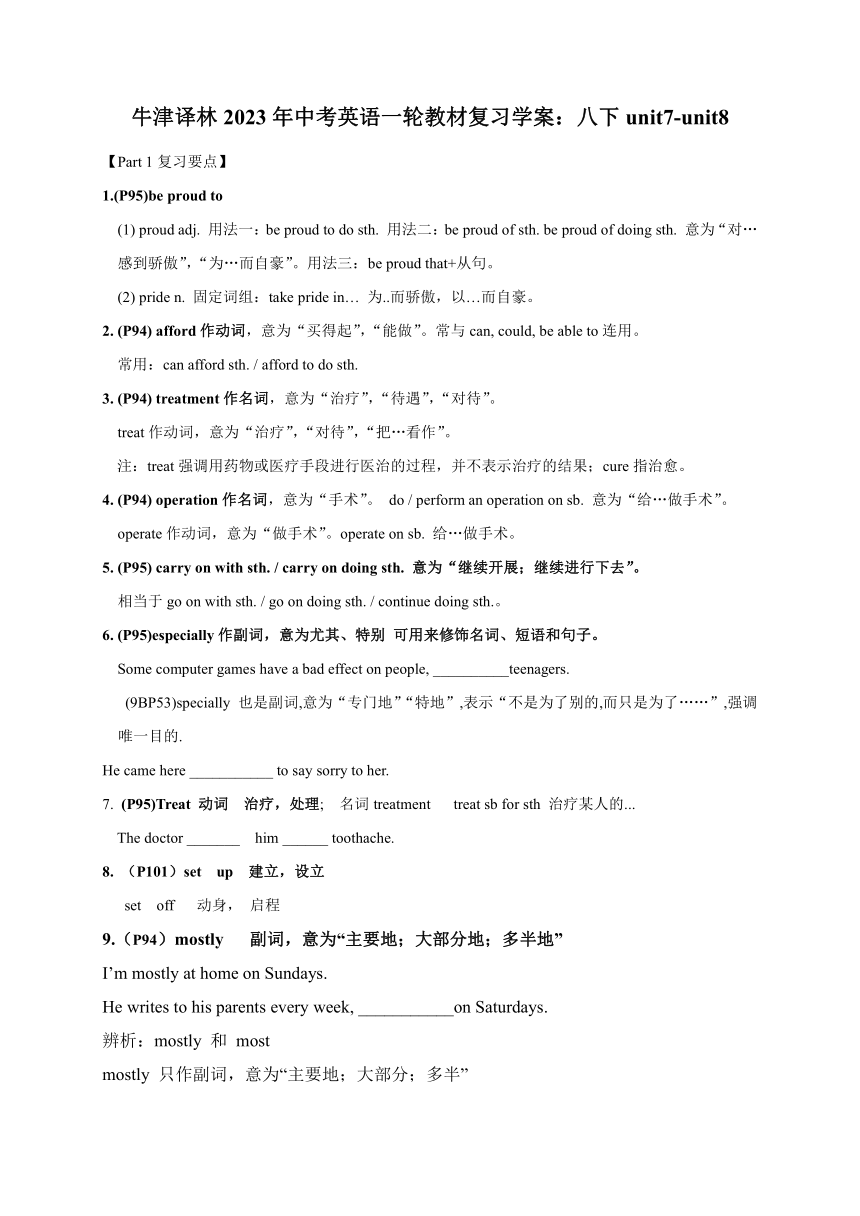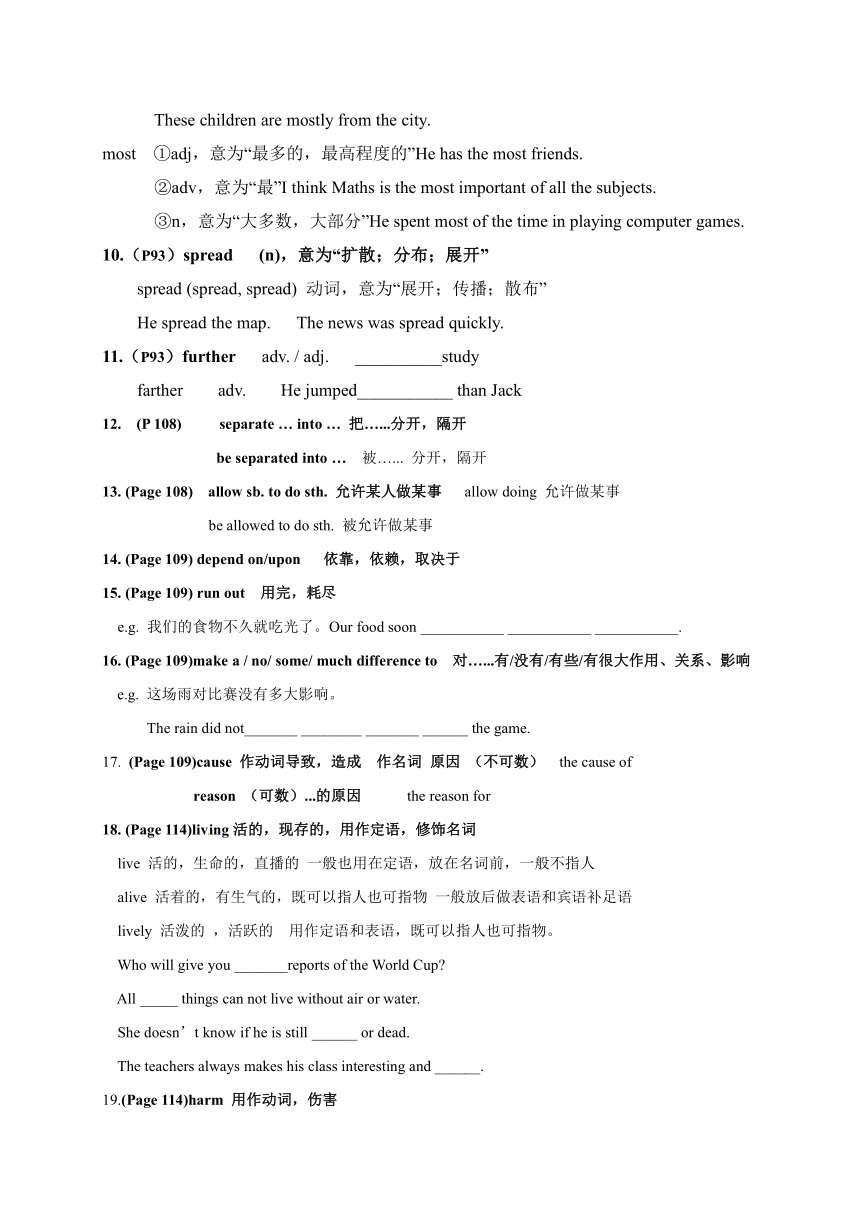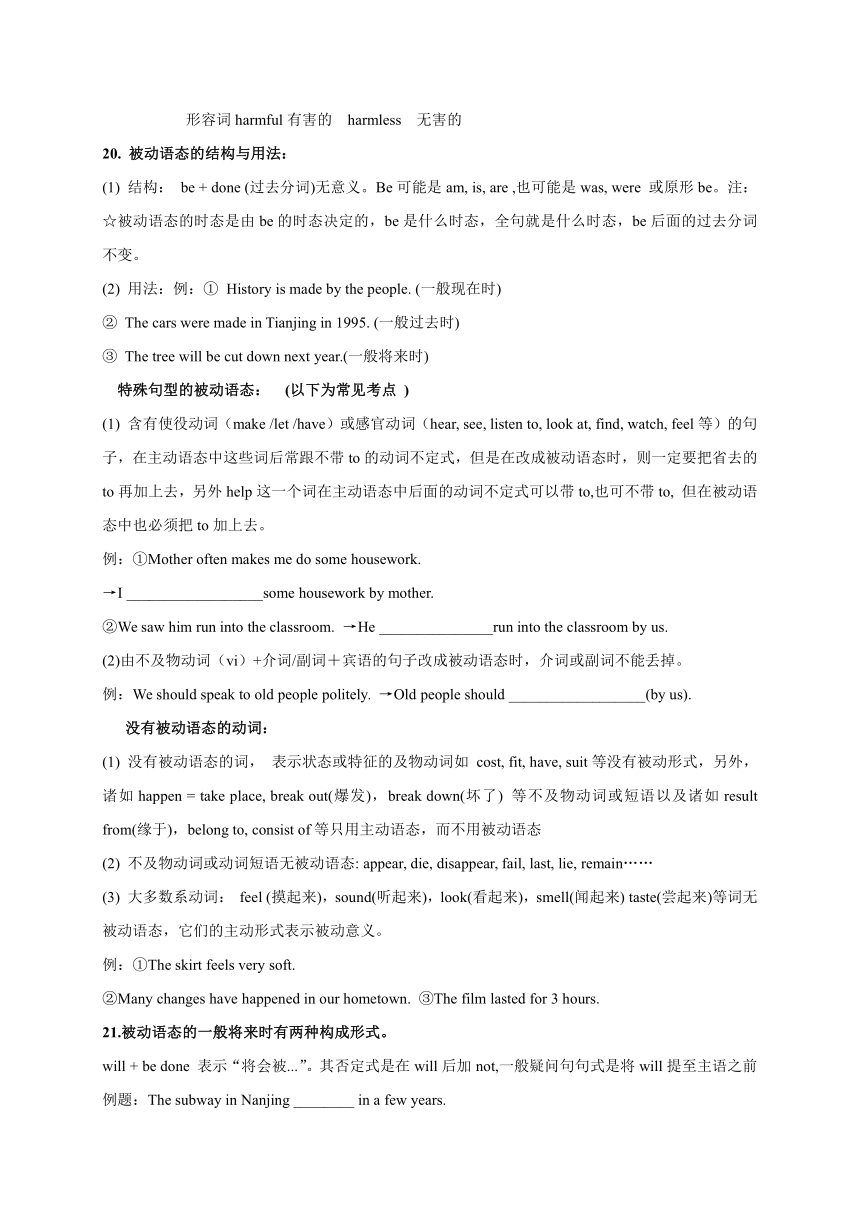牛津译林2023年中考英语一轮教材复习学案:八下unit7-unit8(无答案)
文档属性
| 名称 | 牛津译林2023年中考英语一轮教材复习学案:八下unit7-unit8(无答案) |  | |
| 格式 | docx | ||
| 文件大小 | 30.7KB | ||
| 资源类型 | 教案 | ||
| 版本资源 | 牛津译林版 | ||
| 科目 | 英语 | ||
| 更新时间 | 2023-06-10 07:41:43 | ||
图片预览



文档简介
牛津译林2023年中考英语一轮教材复习学案:八下unit7-unit8
【Part 1复习要点】
1.(P95)be proud to
(1) proud adj. 用法一:be proud to do sth. 用法二:be proud of sth. be proud of doing sth. 意为“对…感到骄傲”,“为…而自豪”。用法三:be proud that+从句。
(2) pride n. 固定词组:take pride in… 为..而骄傲,以…而自豪。
2. (P94) afford作动词,意为“买得起”,“能做”。常与can, could, be able to连用。
常用:can afford sth. / afford to do sth.
3. (P94) treatment作名词,意为“治疗”,“待遇”,“对待”。
treat作动词,意为“治疗”,“对待”,“把…看作”。
注:treat强调用药物或医疗手段进行医治的过程,并不表示治疗的结果;cure指治愈。
4. (P94) operation作名词,意为“手术”。 do / perform an operation on sb. 意为“给…做手术”。
operate作动词,意为“做手术”。operate on sb. 给…做手术。
5. (P95) carry on with sth. / carry on doing sth. 意为“继续开展;继续进行下去”。
相当于go on with sth. / go on doing sth. / continue doing sth.。
6. (P95)especially作副词,意为尤其、特别 可用来修饰名词、短语和句子。
Some computer games have a bad effect on people, __________teenagers.
(9BP53)specially 也是副词,意为“专门地”“特地”,表示“不是为了别的,而只是为了……”,强调 唯一目的.
He came here ___________ to say sorry to her.
(P95)Treat 动词 治疗,处理; 名词treatment treat sb for sth 治疗某人的...
The doctor _______ him ______ toothache.
(P101)set up 建立,设立
set off 动身, 启程
9.(P94)mostly 副词,意为“主要地;大部分地;多半地”
I’m mostly at home on Sundays.
He writes to his parents every week, ___________on Saturdays.
辨析:mostly 和 most
mostly 只作副词,意为“主要地;大部分;多半”
These children are mostly from the city.
most ①adj,意为“最多的,最高程度的”He has the most friends.
②adv,意为“最”I think Maths is the most important of all the subjects.
③n,意为“大多数,大部分”He spent most of the time in playing computer games.
10.(P93)spread (n),意为“扩散;分布;展开”
spread (spread, spread) 动词,意为“展开;传播;散布”
He spread the map. The news was spread quickly.
11.(P93)further adv. / adj. __________study
farther adv. He jumped___________ than Jack
(P 108) separate … into … 把…...分开,隔开
be separated into … 被…... 分开,隔开
13. (Page 108) allow sb. to do sth. 允许某人做某事 allow doing 允许做某事
be allowed to do sth. 被允许做某事
14. (Page 109) depend on/upon 依靠,依赖,取决于
15. (Page 109) run out 用完,耗尽
e.g. 我们的食物不久就吃光了。Our food soon ___________ ___________ ___________.
16. (Page 109)make a / no/ some/ much difference to 对…...有/没有/有些/有很大作用、关系、影响
e.g. 这场雨对比赛没有多大影响。
The rain did not_______ ________ _______ ______ the game.
(Page 109)cause 作动词导致,造成 作名词 原因 (不可数) the cause of
reason (可数)...的原因 the reason for
18. (Page 114)living活的,现存的,用作定语,修饰名词
live 活的,生命的,直播的 一般也用在定语,放在名词前,一般不指人
alive 活着的,有生气的,既可以指人也可指物 一般放后做表语和宾语补足语
lively 活泼的 ,活跃的 用作定语和表语,既可以指人也可指物。
Who will give you _______reports of the World Cup
All _____ things can not live without air or water.
She doesn’t know if he is still ______ or dead.
The teachers always makes his class interesting and ______.
(Page 114)harm 用作动词,伤害
形容词harmful有害的 harmless 无害的
20. 被动语态的结构与用法:
(1) 结构: be + done (过去分词)无意义。Be可能是am, is, are ,也可能是was, were 或原形be。注:☆被动语态的时态是由be的时态决定的,be是什么时态,全句就是什么时态,be后面的过去分词不变。
(2) 用法:例:① History is made by the people. (一般现在时)
② The cars were made in Tianjing in 1995. (一般过去时)
③ The tree will be cut down next year.(一般将来时)
特殊句型的被动语态: (以下为常见考点 )
(1) 含有使役动词(make /let /have)或感官动词(hear, see, listen to, look at, find, watch, feel等)的句子,在主动语态中这些词后常跟不带to的动词不定式,但是在改成被动语态时,则一定要把省去的to再加上去,另外help这一个词在主动语态中后面的动词不定式可以带to,也可不带to, 但在被动语态中也必须把to加上去。
例:①Mother often makes me do some housework.
→I __________________some housework by mother.
②We saw him run into the classroom. →He _______________run into the classroom by us.
(2)由不及物动词(vi)+介词/副词+宾语的句子改成被动语态时,介词或副词不能丢掉。
例:We should speak to old people politely. →Old people should __________________(by us).
没有被动语态的动词:
(1) 没有被动语态的词, 表示状态或特征的及物动词如 cost, fit, have, suit等没有被动形式,另外,诸如happen = take place, break out(爆发),break down(坏了) 等不及物动词或短语以及诸如result from(缘于),belong to, consist of等只用主动语态,而不用被动语态
(2) 不及物动词或动词短语无被动语态: appear, die, disappear, fail, last, lie, remain……
(3) 大多数系动词: feel (摸起来),sound(听起来),look(看起来),smell(闻起来) taste(尝起来)等词无被动语态,它们的主动形式表示被动意义。
例:①The skirt feels very soft.
②Many changes have happened in our hometown. ③The film lasted for 3 hours.
21.被动语态的一般将来时有两种构成形式。
will + be done 表示“将会被...”。其否定式是在will后加not,一般疑问句句式是将will提至主语之前
例题:The subway in Nanjing ________ in a few years.
A.will complete B.will be completed.
C.was completed D.completes
be going to + be done表示打”算被...,将会被....”.其否定式是在be going to中的be后加not,一般疑问句式是将be提至主语前。
例题:The office phones are dirty and they _______________next week.
A.will clean B.cleans
C.are cleaning D.are going to be cleaned
【Part 2课堂巩固】
一、单项选择
( ) 1. ---I think winter is a beautiful season, _______ when it snows. --- Me, too.
A. specially B. especially C. probably D. properly
( ) 2. Seventy-five percent _________the teachers_________ women.
A. of;are B. of;is C. /;are D. /;is
( ) 3. Lucy_______ spend all her pocket money, but now she_______ saving some of it.
A. was used to; used to B. used to; is used to
C. used to; used to D. was used to; is used
( ) 4. The girl is _______a nice girl _______we all want to help her.
A. such; that B. too; to C. so; that D. very; that
( ) 5. In recent years, many children are made _______ what they are not_______ .
A. do; interested in B. to do; interested C. do; interested D. to do; interested in
( ) 6. ---Did Mr. Li come to our party yesterday evening ---No, he______.
A. wasn’t invited B. didn’t invite C. isn’t invited D. hasn’t invited
( ) 7. ---Do you know why he didn’t_______ a word when he_______ to
---Because he was too nervous.
A. speak; speaks B. say; was spoken
C. say; spoke D. speak; is spoken
( ) 8. --- This Maths problem isn’t easy for Jack to work out, is it
--- __________. He is far better at Maths problem than we expected.
A. No, it isn’t B. I am afraid not C. Yes, it is D. I don’t think so
( ) 9. ---Why are you so excited today
---We were told ________ a picnic this weekend.
A. have B. to have C. having D. had
( ) 10. ---Have you heard about that car accident near the school
---Yes, luckily no one ______.
A. hurt B. was hurt C. has hurt D. were hurt
( ) 11. The room can _________ a meeting room.
A. be used to B. be used for C. be used as D. used to
( ) 12. Don’t worry, there is a little time ______.
A. leaves B. left C. has left D. was left
( ) 13. ---He’s seldom late for school, is he ---No, he __________ to school early.
A. is used to go B. isn’t used to go
C. is used to going D. isn’t used to going
( )14.Nowadays many young people can’t _______ to buy the house.
A. spend B. donate C. afford D. provide
( ) 15. ---Why are you so excited today
---We were told _________ a picnic this weekend.
A. have B. to have C. having D. had
词汇运用
1. The result of the _____________(检查)shows that Mrs Lee has caught pneumonia. 2. The boy was successfully___________ on and he is safe now. (手术)
3. The boss has quite a few_____________to help him. (秘书)
4. The star has to spend much time chatting with _____________every year. (采访者)
5. I think _____________ level(水平)in the city is better than that in the countryside. (医学的)
6. Ten people, ____________a baby, were hurt in a crash. (包含)
7. UNICEF works to prevent some serious diseases from_____________ (传播)
8. If you spit everywhere, you will be ____________ in Hongkong. (fine)
9. It is not a good idea to educate children by _____________ them. (punish)
10. Students should learn to spend their pocket money ____________. (wise)
【Part 3拓展训练】
短文首字母填空
In the 1930s, Dan West was farming in Spain. It was wartime, and people were starving (挨饿). An i 1 hit him as he handed out cups of milk to children. “These children don’t need a cup. They need a cow.” This was the b 2 of Heifer International.
Heifer International gives different k 3 of gifts. Its gifts might say “quack” or “moo”. Dan West asked friends in the United States to give gifts of heifers(小母牛), or young cows. S 4 then, Heifer International has given animals to four million families. It gives people the chance to f 5 themselves.
Heifers International wants the people they help to help others. For one project, the group s 6 chickens to some children in Asia. The children yearned for(向往) the day when they could help others. Nine-year-old Julie knew she had to look after her chickens w 7 so they would produce new eggs and healthy chicks. She t 8 good care of them, and they gave birth to strong, healthy chicks. Julie then passed on the gift of chicks to other families.
Because of Heifer International, children can s 9 their days in a schoolhouse instead of working in the fields. They can use the money they earn from their animals to pay for school. Heifer International has made a huge d 10 to people’s lives for many years. People should be grateful to a kindhearted farmer named Dan West.
【Part 1复习要点】
1.(P95)be proud to
(1) proud adj. 用法一:be proud to do sth. 用法二:be proud of sth. be proud of doing sth. 意为“对…感到骄傲”,“为…而自豪”。用法三:be proud that+从句。
(2) pride n. 固定词组:take pride in… 为..而骄傲,以…而自豪。
2. (P94) afford作动词,意为“买得起”,“能做”。常与can, could, be able to连用。
常用:can afford sth. / afford to do sth.
3. (P94) treatment作名词,意为“治疗”,“待遇”,“对待”。
treat作动词,意为“治疗”,“对待”,“把…看作”。
注:treat强调用药物或医疗手段进行医治的过程,并不表示治疗的结果;cure指治愈。
4. (P94) operation作名词,意为“手术”。 do / perform an operation on sb. 意为“给…做手术”。
operate作动词,意为“做手术”。operate on sb. 给…做手术。
5. (P95) carry on with sth. / carry on doing sth. 意为“继续开展;继续进行下去”。
相当于go on with sth. / go on doing sth. / continue doing sth.。
6. (P95)especially作副词,意为尤其、特别 可用来修饰名词、短语和句子。
Some computer games have a bad effect on people, __________teenagers.
(9BP53)specially 也是副词,意为“专门地”“特地”,表示“不是为了别的,而只是为了……”,强调 唯一目的.
He came here ___________ to say sorry to her.
(P95)Treat 动词 治疗,处理; 名词treatment treat sb for sth 治疗某人的...
The doctor _______ him ______ toothache.
(P101)set up 建立,设立
set off 动身, 启程
9.(P94)mostly 副词,意为“主要地;大部分地;多半地”
I’m mostly at home on Sundays.
He writes to his parents every week, ___________on Saturdays.
辨析:mostly 和 most
mostly 只作副词,意为“主要地;大部分;多半”
These children are mostly from the city.
most ①adj,意为“最多的,最高程度的”He has the most friends.
②adv,意为“最”I think Maths is the most important of all the subjects.
③n,意为“大多数,大部分”He spent most of the time in playing computer games.
10.(P93)spread (n),意为“扩散;分布;展开”
spread (spread, spread) 动词,意为“展开;传播;散布”
He spread the map. The news was spread quickly.
11.(P93)further adv. / adj. __________study
farther adv. He jumped___________ than Jack
(P 108) separate … into … 把…...分开,隔开
be separated into … 被…... 分开,隔开
13. (Page 108) allow sb. to do sth. 允许某人做某事 allow doing 允许做某事
be allowed to do sth. 被允许做某事
14. (Page 109) depend on/upon 依靠,依赖,取决于
15. (Page 109) run out 用完,耗尽
e.g. 我们的食物不久就吃光了。Our food soon ___________ ___________ ___________.
16. (Page 109)make a / no/ some/ much difference to 对…...有/没有/有些/有很大作用、关系、影响
e.g. 这场雨对比赛没有多大影响。
The rain did not_______ ________ _______ ______ the game.
(Page 109)cause 作动词导致,造成 作名词 原因 (不可数) the cause of
reason (可数)...的原因 the reason for
18. (Page 114)living活的,现存的,用作定语,修饰名词
live 活的,生命的,直播的 一般也用在定语,放在名词前,一般不指人
alive 活着的,有生气的,既可以指人也可指物 一般放后做表语和宾语补足语
lively 活泼的 ,活跃的 用作定语和表语,既可以指人也可指物。
Who will give you _______reports of the World Cup
All _____ things can not live without air or water.
She doesn’t know if he is still ______ or dead.
The teachers always makes his class interesting and ______.
(Page 114)harm 用作动词,伤害
形容词harmful有害的 harmless 无害的
20. 被动语态的结构与用法:
(1) 结构: be + done (过去分词)无意义。Be可能是am, is, are ,也可能是was, were 或原形be。注:☆被动语态的时态是由be的时态决定的,be是什么时态,全句就是什么时态,be后面的过去分词不变。
(2) 用法:例:① History is made by the people. (一般现在时)
② The cars were made in Tianjing in 1995. (一般过去时)
③ The tree will be cut down next year.(一般将来时)
特殊句型的被动语态: (以下为常见考点 )
(1) 含有使役动词(make /let /have)或感官动词(hear, see, listen to, look at, find, watch, feel等)的句子,在主动语态中这些词后常跟不带to的动词不定式,但是在改成被动语态时,则一定要把省去的to再加上去,另外help这一个词在主动语态中后面的动词不定式可以带to,也可不带to, 但在被动语态中也必须把to加上去。
例:①Mother often makes me do some housework.
→I __________________some housework by mother.
②We saw him run into the classroom. →He _______________run into the classroom by us.
(2)由不及物动词(vi)+介词/副词+宾语的句子改成被动语态时,介词或副词不能丢掉。
例:We should speak to old people politely. →Old people should __________________(by us).
没有被动语态的动词:
(1) 没有被动语态的词, 表示状态或特征的及物动词如 cost, fit, have, suit等没有被动形式,另外,诸如happen = take place, break out(爆发),break down(坏了) 等不及物动词或短语以及诸如result from(缘于),belong to, consist of等只用主动语态,而不用被动语态
(2) 不及物动词或动词短语无被动语态: appear, die, disappear, fail, last, lie, remain……
(3) 大多数系动词: feel (摸起来),sound(听起来),look(看起来),smell(闻起来) taste(尝起来)等词无被动语态,它们的主动形式表示被动意义。
例:①The skirt feels very soft.
②Many changes have happened in our hometown. ③The film lasted for 3 hours.
21.被动语态的一般将来时有两种构成形式。
will + be done 表示“将会被...”。其否定式是在will后加not,一般疑问句句式是将will提至主语之前
例题:The subway in Nanjing ________ in a few years.
A.will complete B.will be completed.
C.was completed D.completes
be going to + be done表示打”算被...,将会被....”.其否定式是在be going to中的be后加not,一般疑问句式是将be提至主语前。
例题:The office phones are dirty and they _______________next week.
A.will clean B.cleans
C.are cleaning D.are going to be cleaned
【Part 2课堂巩固】
一、单项选择
( ) 1. ---I think winter is a beautiful season, _______ when it snows. --- Me, too.
A. specially B. especially C. probably D. properly
( ) 2. Seventy-five percent _________the teachers_________ women.
A. of;are B. of;is C. /;are D. /;is
( ) 3. Lucy_______ spend all her pocket money, but now she_______ saving some of it.
A. was used to; used to B. used to; is used to
C. used to; used to D. was used to; is used
( ) 4. The girl is _______a nice girl _______we all want to help her.
A. such; that B. too; to C. so; that D. very; that
( ) 5. In recent years, many children are made _______ what they are not_______ .
A. do; interested in B. to do; interested C. do; interested D. to do; interested in
( ) 6. ---Did Mr. Li come to our party yesterday evening ---No, he______.
A. wasn’t invited B. didn’t invite C. isn’t invited D. hasn’t invited
( ) 7. ---Do you know why he didn’t_______ a word when he_______ to
---Because he was too nervous.
A. speak; speaks B. say; was spoken
C. say; spoke D. speak; is spoken
( ) 8. --- This Maths problem isn’t easy for Jack to work out, is it
--- __________. He is far better at Maths problem than we expected.
A. No, it isn’t B. I am afraid not C. Yes, it is D. I don’t think so
( ) 9. ---Why are you so excited today
---We were told ________ a picnic this weekend.
A. have B. to have C. having D. had
( ) 10. ---Have you heard about that car accident near the school
---Yes, luckily no one ______.
A. hurt B. was hurt C. has hurt D. were hurt
( ) 11. The room can _________ a meeting room.
A. be used to B. be used for C. be used as D. used to
( ) 12. Don’t worry, there is a little time ______.
A. leaves B. left C. has left D. was left
( ) 13. ---He’s seldom late for school, is he ---No, he __________ to school early.
A. is used to go B. isn’t used to go
C. is used to going D. isn’t used to going
( )14.Nowadays many young people can’t _______ to buy the house.
A. spend B. donate C. afford D. provide
( ) 15. ---Why are you so excited today
---We were told _________ a picnic this weekend.
A. have B. to have C. having D. had
词汇运用
1. The result of the _____________(检查)shows that Mrs Lee has caught pneumonia. 2. The boy was successfully___________ on and he is safe now. (手术)
3. The boss has quite a few_____________to help him. (秘书)
4. The star has to spend much time chatting with _____________every year. (采访者)
5. I think _____________ level(水平)in the city is better than that in the countryside. (医学的)
6. Ten people, ____________a baby, were hurt in a crash. (包含)
7. UNICEF works to prevent some serious diseases from_____________ (传播)
8. If you spit everywhere, you will be ____________ in Hongkong. (fine)
9. It is not a good idea to educate children by _____________ them. (punish)
10. Students should learn to spend their pocket money ____________. (wise)
【Part 3拓展训练】
短文首字母填空
In the 1930s, Dan West was farming in Spain. It was wartime, and people were starving (挨饿). An i 1 hit him as he handed out cups of milk to children. “These children don’t need a cup. They need a cow.” This was the b 2 of Heifer International.
Heifer International gives different k 3 of gifts. Its gifts might say “quack” or “moo”. Dan West asked friends in the United States to give gifts of heifers(小母牛), or young cows. S 4 then, Heifer International has given animals to four million families. It gives people the chance to f 5 themselves.
Heifers International wants the people they help to help others. For one project, the group s 6 chickens to some children in Asia. The children yearned for(向往) the day when they could help others. Nine-year-old Julie knew she had to look after her chickens w 7 so they would produce new eggs and healthy chicks. She t 8 good care of them, and they gave birth to strong, healthy chicks. Julie then passed on the gift of chicks to other families.
Because of Heifer International, children can s 9 their days in a schoolhouse instead of working in the fields. They can use the money they earn from their animals to pay for school. Heifer International has made a huge d 10 to people’s lives for many years. People should be grateful to a kindhearted farmer named Dan West.
